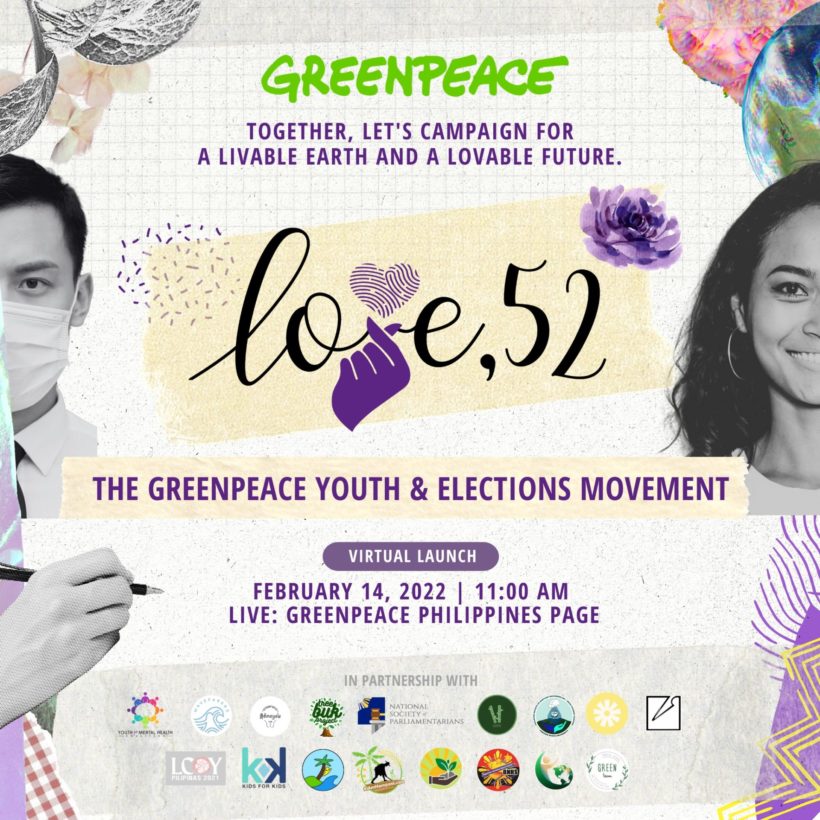2022 will be a critical year for the Philippines as it holds national elections to determine the next leaders of the land, as well as a crucial window for climate action. The youth, which comprises 52% of the total voting population, will have a significant role in electing the right leaders and consequently, shaping a future that’s just, peaceful, livable, and loveable.
On Valentine’s Day, Greenpeace and various youth groups called on the 2022 election candidates to prove their love for the country by committing to an electoral agenda that addresses climate and environmental injustices and supports democratic governance that promotes active citizen participation.
The Love, 52[1] Youth and Elections Movement is built on the participation of more than 20 organizations from the three Philippine islands of Luzon, Visayas, and Mindanao, with different advocacies – including human rights, mental health, good governance, and the environment. The youth representatives wrote a love letter to the country, outlining the impact of the climate crisis on their loved ones, fellow Filipinos, and respective communities.
The love letter will be sent to the candidates for their signature and commitment to said calls, which include prioritizing environmental and social issues in electoral discourse, coming up with a coherent plan to address the climate crisis, and supporting a vibrant democracy that would enable climate and environmental justice.
“We feel that the discussions around the 2022 elections, so far, have been missing key issues that matter to the youth and our loved ones,” said Cris Jamil Hertez, 20, of the Better Normal Youth Movement[2]. The group submitted a Better Normal Youth Agenda to President Duterte in 2020, containing the youth’s vision of the country’s post-pandemic recovery. “At a time when both a health and a climate crisis are upon us, and with the most crucial election of our generation coming up, we have to listen to those who will reap the fruits – or consequences – of today’s actions.”
“While we believe in bayanihan* and our individual responsibilities, we can only do so much as citizens,” said Rorei Asinero, 22, of the TreeBuk Project. “If these candidates truly love the country, as they say during their campaign sorties, they must show that love by protecting the Philippines and Filipinos from the worsening impacts of the climate crisis.”
Greenpeace said 2022 is a crucial window for climate action, given the urgency of addressing the climate crisis. An IPCC report released earlier this year affirmed that the climate system is rapidly changing, and the scale of change is unprecedented. It also affirmed that weather extremes will be more intense and more frequent.[3]
“Our next leaders have a prime opportunity to put the nation on alert and institute policies that would help us in the struggle for climate justice,” said Greenpeace campaigner Joanna Sustento. “The strength of those vying for power should be tested on destructive industries such as fossil fuels and single-use plastic production, who should be held accountable for their contributions to the climate crisis.”
The environmental group had previously called on election candidates to highlight climate issues on the campaign trail and unveil their strategies for addressing the climate crisis. The group is urging Filipino voters, especially the youth who comprise a majority of the voting population, to consider these when choosing the right leaders.
“This is not just shading on a ballot – we are talking about the future of our country and our next generations. 2022 should not just be another year of loss and statistics; it must be the year of climate justice,” Sustento said.
###
Notes:
[1] Love, 52 is a reference to the 52% youth composition of the current voting population. According to the Commission on Elections (Comelec), 52% of the voting population is Filipinos aged 18-40 (classified as the youth vote).
[2] Thank You, Next!: Filipino Youth Hold The Key For A #BetterNormal
[3] AR6 Climate Change 2021: The Physical Science Basis, UN Intergovernmental Panel on Climate Change
*Bayanihan is a Filipino custom derived from the Tagalog word “bayan” for nation, town or community. Bayanihan literally means “being in a bayan” and it refers to a fundamental aspect of Filipino culture: working together as a community to achieve a common goal. Bayanihan also came from the word bayani which means someone who loves his bayan.
Media Contact:
Maverick Flores
Communications Campaigner, Greenpeace Philippines
+639176211552 | maverick.flores@greenpeace.org










